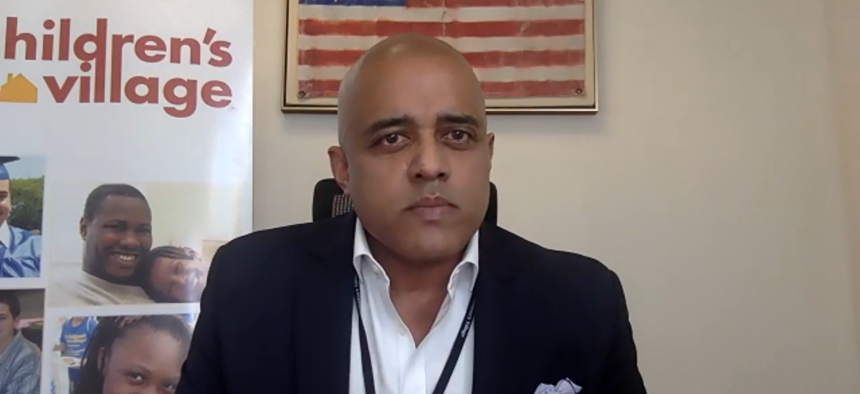How New York’s nonprofit leaders support staff during the pandemic

Jeremy Christopher Kohomban, president and CEO of The Children’s Village, at NYN Media’s Nonprofit CheckUp event. Zoom
It’s been a difficult time to be employed in the nonprofit sector. Organizations have been financially decimated by the COVID-19 pandemic after being forced to abandon traditional funding supplied by in-person events, and facing reduced government funds and declining earned revenue. Those funding losses have translated into job losses for many workers in the sector. Though nonprofit employment nationwide inched upward last month, it’s still about 7% smaller than it was in February, according to the Johns Hopkins University Center for Civil Society Studies.
That means it’s all the more important for nonprofit leaders to be transparent with their staff, according to speakers at yesterday’s NYN Media Nonprofit CheckUp event.
“It’s been so important for our staff to know what we’re thinking before it’s fully baked,” said Donna Lieberman, executive director of the New York Civil Liberties Union. “And, of course, that means to have some input into how the baking goes.”
For Jennifer Jones Austin, CEO and executive director of FPWA, that also means being more open about the organization’s finances. But it’s sometimes still been difficult to set staff members’ minds at ease. In March, she said, she told staff that no layoffs or furloughs were incoming and that the nonprofit was fine through October. But staff interpreted that to mean that layoffs would be on the table in October.
“One of the things that we sometimes do not talk about when we talk about the operational and financial health of organizations during this time is the anxiety that the staff experience when they see that the world is just falling apart,” she said.
The Children’s Village aimed to ease some stress among its employees by paying overtime and instituting a 25% salary increase for its front-line workers earlier on in the pandemic. Jeremy Christopher Kohomban, president and CEO of the nonprofit, said it was impossible to bridge the inequality between workers who can work from home and essential workers, but it was important to be honest about that unfairness and listen.
“We’ll be as attentive to you as we possibly can,” Kohomban said, referring to front-line employees. “Ask us if we are not doing something that we should be doing. Put us to the test. Challenge us in public if you need to.” He added that the organization makes an effort to ensure front-line workers – who are largely people of color – have opportunities to move forward in their careers. “The problem with race and equity is, so many of our people of color are put into dead-end jobs.”
NEXT STORY: State Senate Democrats claim supermajority
